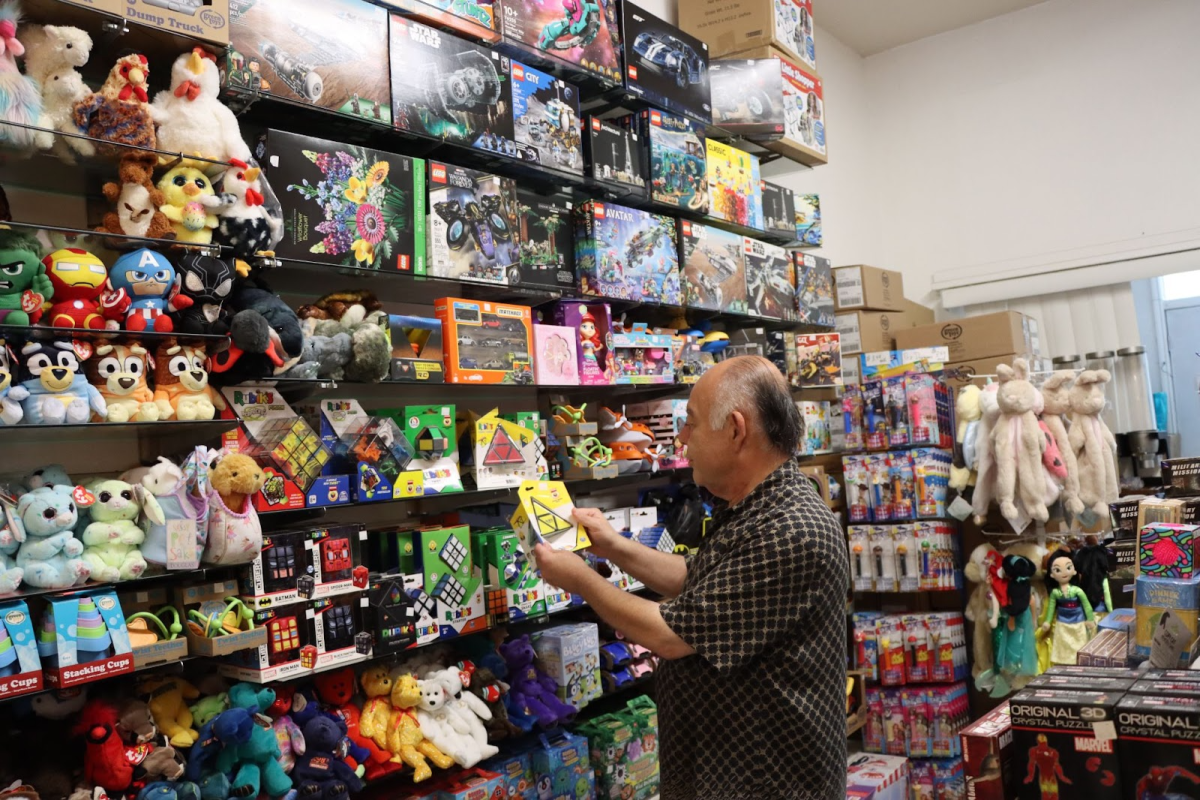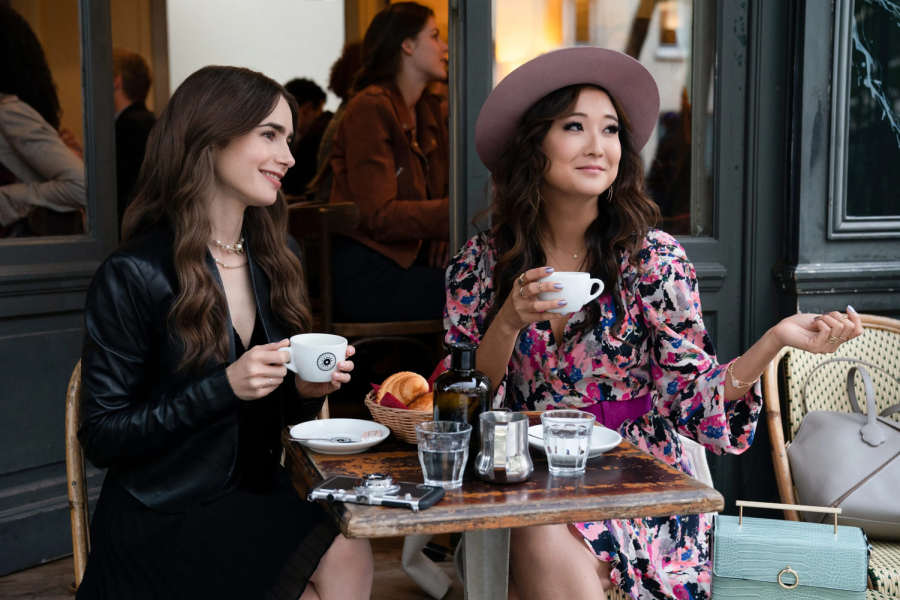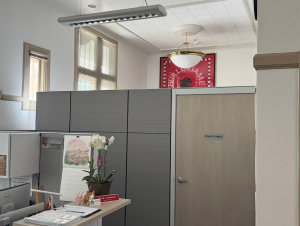‘Emily in Paris’ goes beyond croissants and the Eiffel Tower
Although containing an abundance of French clichés — like enjoying croissants and a coffee at a café with a friend — “Emily in Paris” portrays some truth about Parisians.
February 23, 2023
When I envisioned “Emily in Paris,” Andrew Fleming’s newest wildly popular Netflix show, all of the city’s stereotypes came to mind: a buttery croissant at a café overlooking the Seine, a stroll along the Champs-Élysées in a striped breton shirt and beret and panoramic selfies atop the Eiffel Tower.
Although the series had been recommended to me more than once, I refrained from watching it to avoid the inevitable corny clichés. I thought the show would falsely portray life in Paris — where I was born and raised until moving to the US at age 11. During that time, I attended a French-speaking school, and my father’s family is from southern France. As you might imagine, an American Netflix series didn’t sound like it was going to adequately reflect the France I knew and loved. But as the show’s popularity rose, so did my curiosity. Keen to discover whether it lived up to all the excitement, I finally decided to watch the series.
In the next few days, all you could find me doing was sitting on the couch, glued to the screen and enthralled in a journey through Paris. I finished all three seasons in a single weekend. And I was not disappointed.
To be clear, the show did contain an abundance of French stereotypes. For this reason, when I began watching the show, my inner Parisian protested, and I became protective of the city where I was born and raised.
But it was the American side of me that silenced those thoughts and kept me captivated to the screen. Because of my dual French and American upbringing, I understood both cultures’ point of view. Since I am familiar with French mannerisms and idiosyncrasies, I can sympathize with Emily and her frustration with the French.
When the Chicago-based Emily Cooper’s life takes a sudden turn, and she is sent to Paris for a year to work for a French advertisement agency, she is in for an unforgettable, once-in-a-lifetime experience. Emily can’t wait to move to a city known for elegance and romance. Soon after she arrives, however, she finds out that Paris and her hometown Chicago are not only on opposite sides of the world, but their cultures couldn’t be more different — making the transition between the two cities all the more taxing for the enthusiastic girl.
Through Emily’s eyes, I saw how Parisians are portrayed from the perspective of an outsider. I would often find myself laughing at Emily’s struggles with the often arrogant French so set in their ways because I could relate with her as my multi-cultural background allowed me to see the world through the eyes of both a Parisian and an American.
Due to my French heritage, I was able to catch onto things that people typically wouldn’t have understood. For instance, Emily feels unwanted, simple-minded and naive because her new colleagues don’t make an effort to welcome her. Don’t get the wrong idea, it’s not because she is American; French culture sometimes tends to be close-minded to other cultures. They sometimes think that France is the most important country in the world and dismiss other nationalities. To make my point, Emily’s coworkers make fun of her by referring to her as “la plouc”, translating to “hick” or “redneck”— a derogatory term for a simple, provincial person.
What makes it all the more difficult for Emily and her colleagues to be on terms is that she is unable to speak French. French people can be impatient, stubborn and irritable — someone who doesn’t know how to speak their language will inevitably bring out these characteristics. I can sympathize with Emily’s struggle as I witnessed this grouchy behavior many times. I recall, when an American kid who couldn’t speak French transferred to my third-grade class, the teacher made little effort to help him understand the lesson, and as the only English speaker in the class, I was requested to translate for him.
I also thought Emily’s boss was a funny depiction of the typical French woman (and not only because she is always flawlessly dressed). She is portrayed as a hard-as-nails boss who does not approve of Emily. Sylvie reminds me of my elementary school teachers, who terrified me with their uptight, scary and judgmental attitude.
However, Emily’s struggles go beyond the workplace. In Chicago, she was used to very friendly customer service: people with big smiles on their faces who ask about your day and look for ways to be helpful. In Paris, you shouldn’t expect that same treatment. Customer service is basically non-existent. The philosophy of many French is: “I don’t have time for this, figure it out by yourself.”
Emily’s experiences are similar. When she goes to the café next door, hoping to get a taste of the delicious French breakfast, she asks for a pain au chocolat, struggling with her American accent, but the owner of the bakery cuts her off and very rudely corrects her pronunciation.
As much as I enjoyed the show myself, my friends in Paris weren’t so supportive of it. When the topic of “Emily in Paris” came up in a conversation with them, they rolled their eyes like true Parisians, saying that the show portrayed a false image of their city and depicted the French in a stereotyped, often unpleasant, way. They didn’t even like her clothes!
On the other hand, some Americans may have missed the message of the show, meant to capture the characteristics of the French, and seen only the glorified American stereotypes of Parisian culture — magnificent sites, elegant fashion and good food and wine. For instance, my friends in the US were ecstatic after having watched the third season of the show, gushing over how they wished to be Emily, experiencing the chic and trendy Parisian lifestyle.
From my point of view, “Emily in Paris” is so much more than I initially thought it would be. The show might be about delicious croissants and beautiful monuments, but it also highlights some of the French stereotypes in an accessible and fun drama series. Regardez, vous l’aimerez (Watch it, you’ll love it).










































